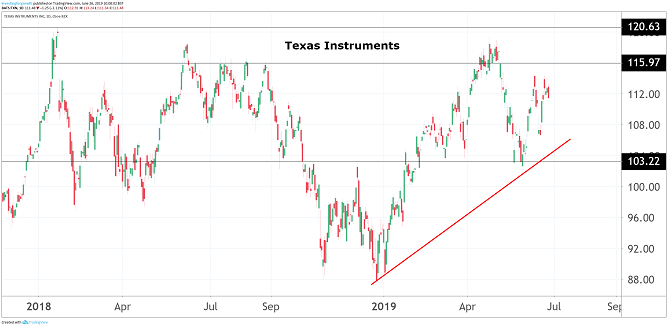This $100bn tech favourite should be worth more
Big profits, strong cash flow and generous dividend make this childhood favourite one to buy now.
26th June 2019 11:02
by Rodney Hobson from interactive investor
Big profits, strong cash flow and generous dividend make this childhood favourite one to buy now.

Rodney Hobson is an experienced financial writer and commentator who has held senior editorial positions on publications and websites in the UK and Asia, including Business News Editor on The Times and Editor of Shares magazine. He speaks at investment shows, including the London Investor Show, and on cruise ships. His investment books include Shares Made Simple, the best-selling beginner's guide to the stock market. He is qualified as a representative under the Financial Services Act.
Semiconductors and integrated circuits maker Texas Instruments (NASDAQ:TXN) was a real go-go stock until a couple of years ago. It's been a bit sluggish recently, but it is still worth considering while the share price is below its best level.
Based in Dallas, it has design, manufacturing or sales operations in more than 30 countries, using its own factories to keep control of quality and supply chains. It sells to 100,000 electronics designers and manufacturers globally operating through two segments: analogue and embedded processing.
Analogue products support applications such as automotive safety devices, touchscreen controllers, low-voltage motor drivers and integrated motor controllers. Embedded processing products include digital signal processors that perform mathematical computations to process digital data.
If that all sounds too techie for most investors, every electronics device uses some form of analogue, and most use embedded processing. Markets are highly diversified, with tens of thousands of customers using similar technologies in a wide range of applications. Rather surprisingly, given the speed with which technology changes, Texas aims to produce products that have a long life, lasting for up to 30 years.

Source: TradingView Past performance is not a guide to future performance
Texas boasts that it helps electronics designers "unlock new possibilities that make the world smarter, safer, more connected and more efficient than ever before" and that market needs dictate how it designs products while competitors try to make the market fit their products.
It claims that its chosen markets of industrial and automotive offer solid growth opportunities because manufacturers will find more and more uses for the technology, although all its markets offer promising growth prospects.
In automotive, the chip content continues to expand as cars have more electronic applications than ever before. For example, driver-assist and collision-avoidance systems, once limited to high-end cars, today are commonplace features. This trend toward higher semiconductor content will inevitably expand as the percentage of hybrid, electric and autonomous vehicles on the road grows.
However, Texas believes that there are even more exciting opportunities in the industrial market, which is still in the early stages of adopting semiconductors, for example, smart thermostats, door locks and appliances that can sense motion, humidity, temperature, and then transmit information wirelessly, or sensors in tanks that gauge fluid levels and dispatch an automated alert when a refill is required.
Its markets are highly fragmented, so a large company can enjoy strong positions with ample room to grow market share. Its manufacturing technologies and equipment have long life cycles so they are less capital intensive than many other types of chips.
From an investment point of view, a key reason to consider Texas shares is its ability to produce strong free cash flow, much of which is returned to shareholders. The dividend was raised last October, the 15th consecutive year of dividend hikes, and a share buyback programme that has reduced the number of shares by 45% in the past 15 years is ongoing. Cash generated also funds research and development, with $1.5 billion spent last year.
Although turnover slipped slightly in the final quarter of 2018, net profits multiplied from $340 million to $1.24 billion. The final dividend of 77 cents made a total of $2.63 for the year, up from $2.12 in 2017.
Revenue was down again in the first quarter of 2019, and so was net profit, by 11%, which is obviously worrying. However, continued strong cash flow means the dividend is safe for now and the wide range of products and customers means that Texas can ride out the tougher times.
The shares have been as high as $119 but they currently trade at around $111.50, offering a prospective yield of nearly 3% assuming a likely dividend increase for the final two quarters of this year.
Hobson's choice: Take advantage of the fallback in the shares and buy at up to $115.
Rodney Hobson is a freelance contributor and not a direct employee of interactive investor.
These articles are provided for information purposes only. Occasionally, an opinion about whether to buy or sell a specific investment may be provided by third parties. The content is not intended to be a personal recommendation to buy or sell any financial instrument or product, or to adopt any investment strategy as it is not provided based on an assessment of your investing knowledge and experience, your financial situation or your investment objectives. The value of your investments, and the income derived from them, may go down as well as up. You may not get back all the money that you invest. The investments referred to in this article may not be suitable for all investors, and if in doubt, an investor should seek advice from a qualified investment adviser.
Full performance can be found on the company or index summary page on the interactive investor website. Simply click on the company's or index name highlighted in the article.
Disclosure
We use a combination of fundamental and technical analysis in forming our view as to the valuation and prospects of an investment. Where relevant we have set out those particular matters we think are important in the above article, but further detail can be found here.
Please note that our article on this investment should not be considered to be a regular publication.
Details of all recommendations issued by ii during the previous 12-month period can be found here.
ii adheres to a strict code of conduct. Contributors may hold shares or have other interests in companies included in these portfolios, which could create a conflict of interests. Contributors intending to write about any financial instruments in which they have an interest are required to disclose such interest to ii and in the article itself. ii will at all times consider whether such interest impairs the objectivity of the recommendation.
In addition, individuals involved in the production of investment articles are subject to a personal account dealing restriction, which prevents them from placing a transaction in the specified instrument(s) for a period before and for five working days after such publication. This is to avoid personal interests conflicting with the interests of the recipients of those investment articles.